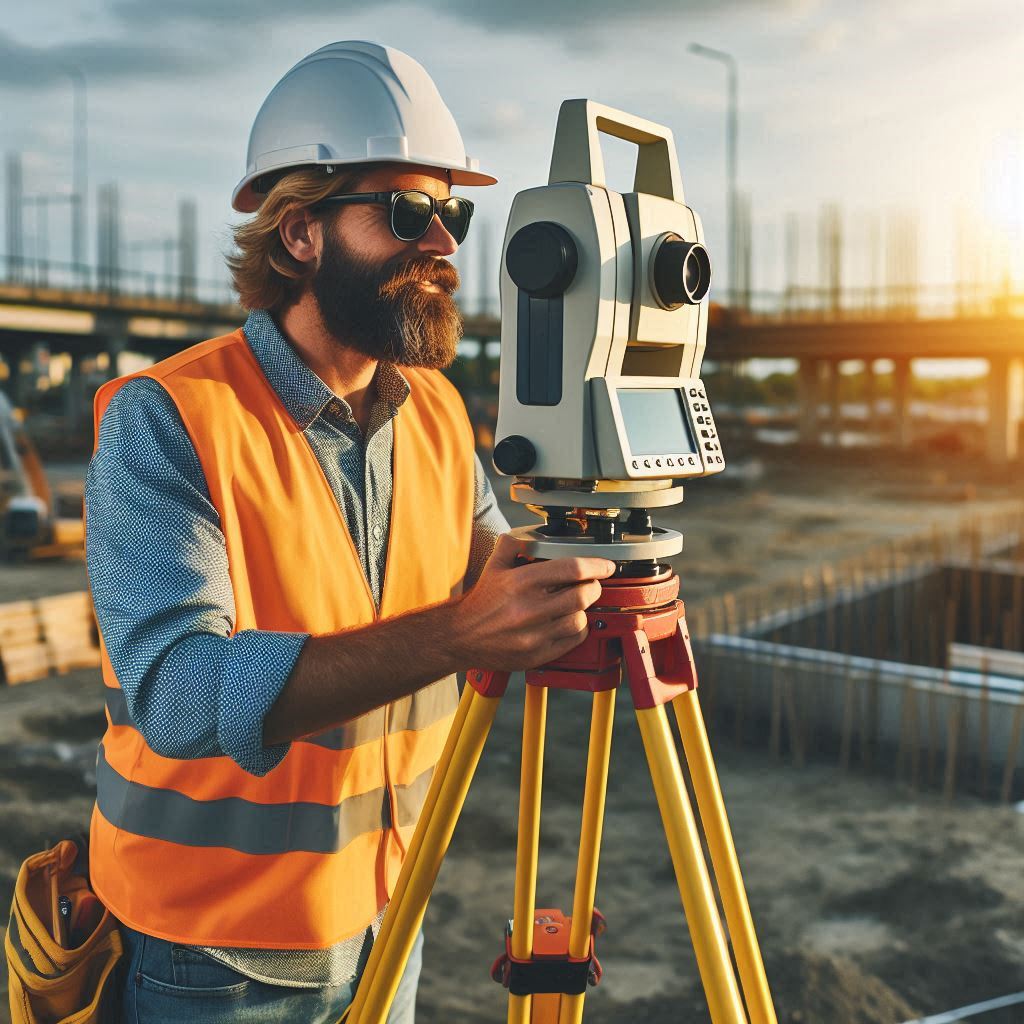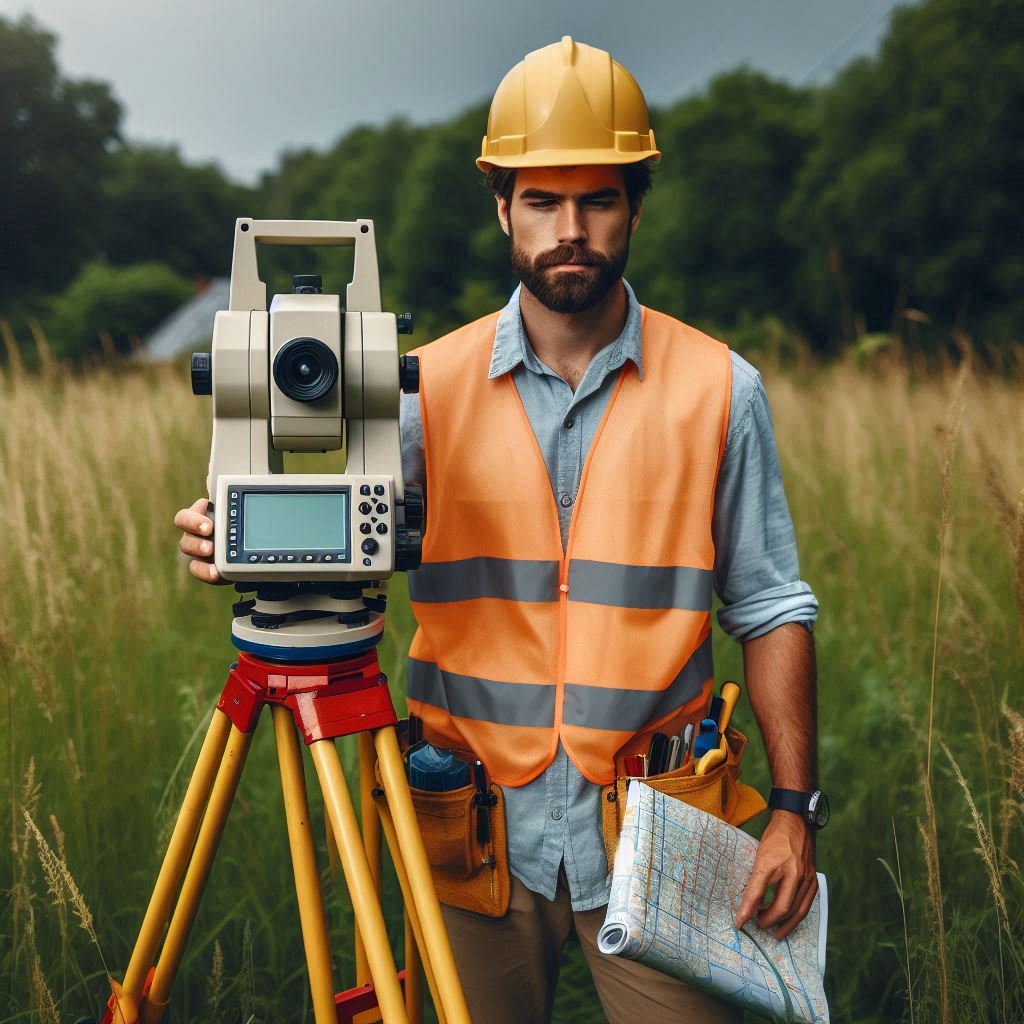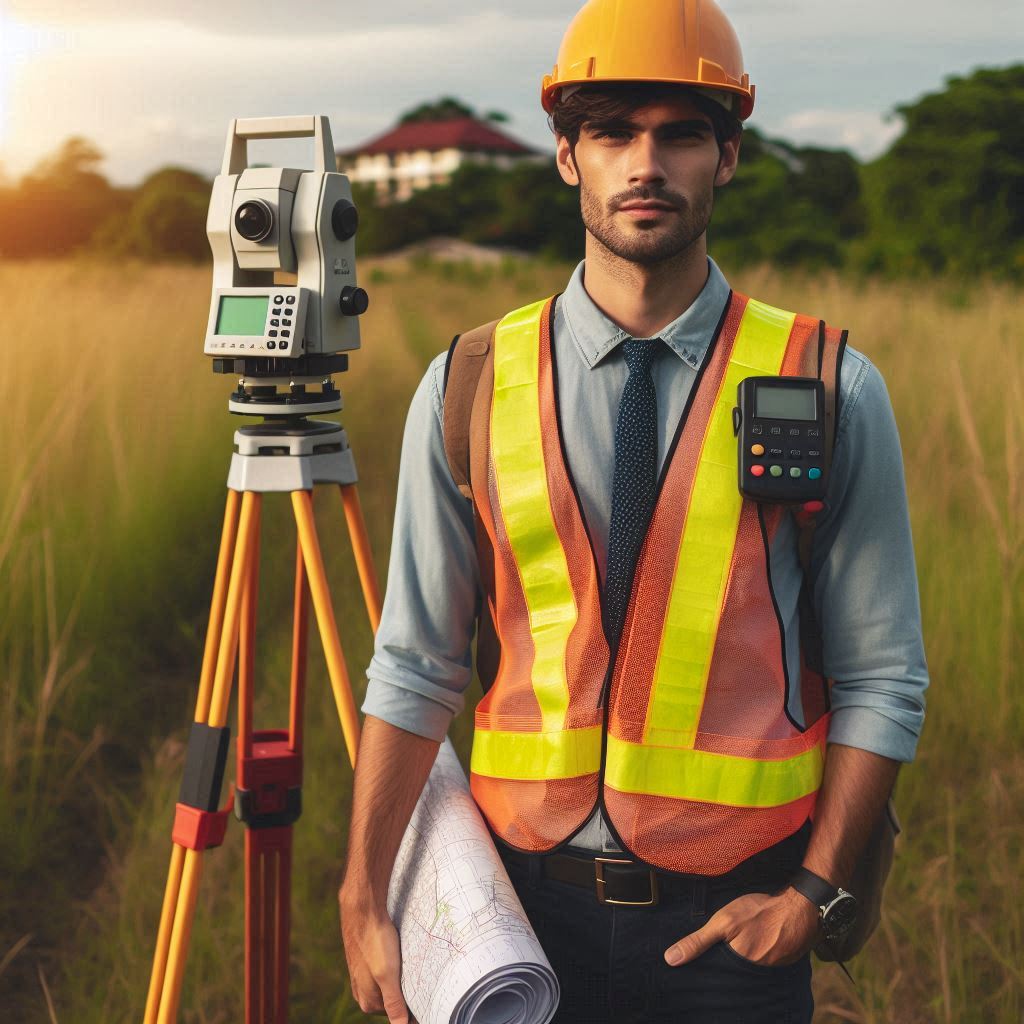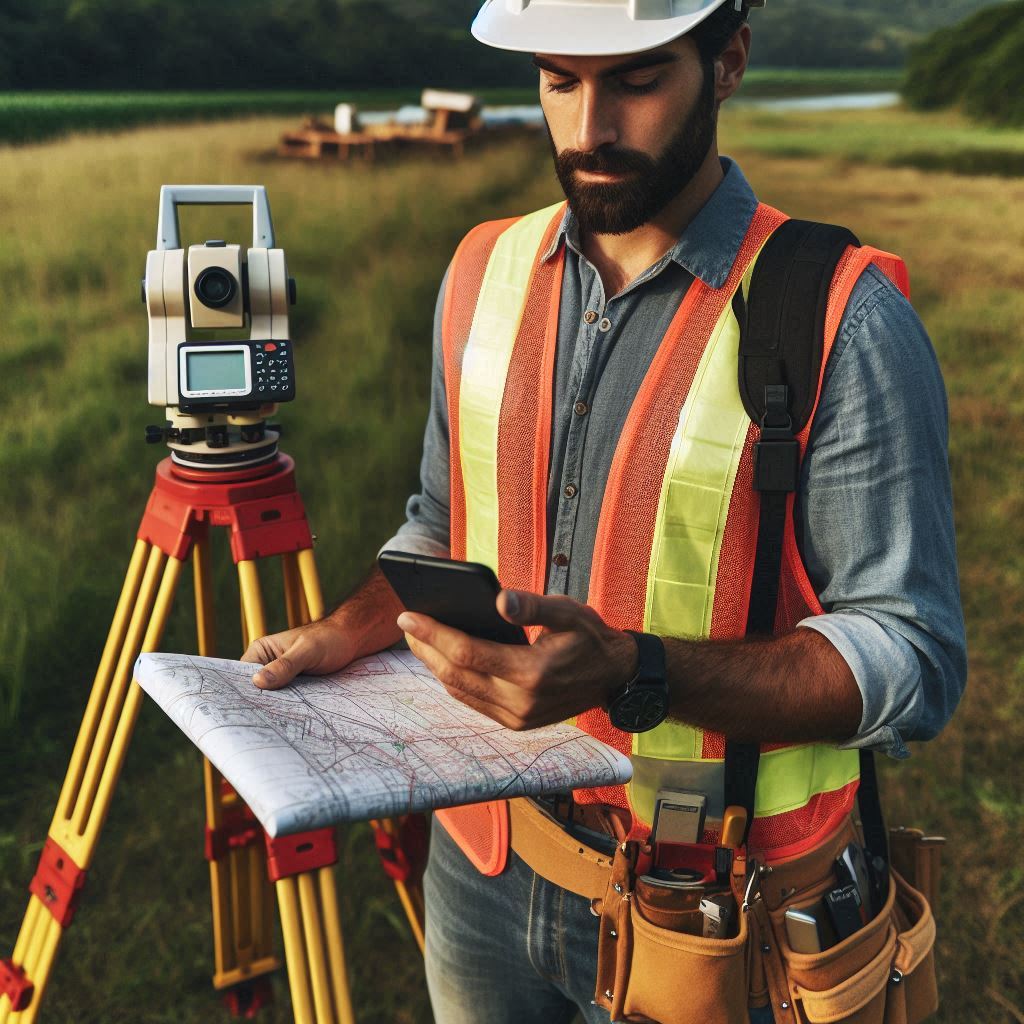Introduction
The Importance of Surveying and Mapping Technicians in Various Industries
Surveying and mapping technicians play a crucial role across multiple industries.
Their work supports construction, urban planning, and environmental management by providing accurate geographical data.
This data is essential for making informed decisions, ensuring projects are efficient, safe, and sustainable.
The Role of Surveying and Mapping Technicians in Collecting and Analyzing Geographical Data
Surveying and mapping technicians are responsible for collecting and analyzing geographical data.
They employ advanced tools and software to gather precise information about land, structures, and natural resources.
Their expertise ensures that the data collected is accurate and reliable, forming the backbone of planning and development.
Surveying and mapping technicians must possess a diverse set of skills to excel.
Technical proficiency in tools and software is fundamental.
Strong communication skills are necessary for effective collaboration.
Attention to detail ensures accuracy in measurements and data collection.
Problem-solving abilities allow technicians to address challenges in the field.
Physical fitness is crucial for demanding outdoor tasks, while time management skills enable technicians to meet deadlines efficiently.
These skills are essential for successful surveying and mapping projects.
Developing and honing these abilities will lead to career growth and professional excellence.
Aspiring technicians should focus on mastering these skills to contribute meaningfully to the field.
Technical Skills
The Importance of Having Proficiency in Using Surveying Equipment Such as GPS Devices and Total Stations
Surveying and mapping technicians must possess strong technical skills to excel in their roles.
Proficiency in using surveying equipment like GPS devices and total stations is essential.
These tools are the backbone of accurate data collection in the field.
GPS devices allow technicians to pinpoint precise locations, ensuring data accuracy.
Total stations, on the other hand, combine electronic distance measurement with angle measurement.
This combination provides detailed information crucial for creating accurate maps and models.
Mastering the use of GPS devices and total stations requires practice and understanding.
Technicians must know how to calibrate, troubleshoot, and maintain these instruments.
Proper calibration ensures that data collected is reliable and accurate.
Troubleshooting skills are vital when equipment malfunctions in the field, avoiding costly delays.
Regular maintenance of these tools also extends their lifespan, saving costs in the long run.
The Knowledge of Using GIS Software for Data Analysis and Mapping Purposes
In addition to surveying equipment, knowledge of Geographic Information Systems (GIS) software is indispensable.
GIS software allows technicians to analyze and interpret spatial data, creating comprehensive maps and models.
Proficiency in GIS enables technicians to overlay various data layers, providing a deeper understanding of the surveyed area.
This skill is crucial for tasks such as urban planning, environmental assessment, and infrastructure development.
Technicians must also be adept at using GIS software for data management.
This includes importing, organizing, and analyzing large datasets efficiently.
Understanding how to use GIS tools like ArcGIS or QGIS enhances a technician’s ability to deliver accurate and meaningful results.
Furthermore, the ability to generate clear and concise reports using GIS data is an invaluable skill.
These reports guide decision-makers, ensuring informed choices based on accurate data analysis.
The Ability to Read and Interpret Maps and Blueprints Accurately
The ability to read and interpret maps and blueprints accurately is another critical technical skill.
Maps and blueprints are the primary communication tools in surveying and mapping.
Technicians must be able to understand symbols, scales, and coordinates on these documents.
Accurate interpretation ensures that the fieldwork aligns with the project‘s design and objectives.
Misinterpretation can lead to errors in construction, costing time and resources.
Reading and interpreting blueprints requires attention to detail and spatial awareness.
Technicians must visualize three-dimensional structures from two-dimensional drawings.
This skill is essential when working on complex projects like road construction or building developments.
Misreading a blueprint can result in significant setbacks and safety hazards.
Technical skills are fundamental for surveying and mapping technicians.
Proficiency in using surveying equipment, GIS software, and interpreting maps ensures accuracy and efficiency in their work.
Mastery of these skills leads to successful project outcomes and contributes to the overall success of any surveying or mapping endeavor.
Read: Biomedical Engineering: Impact on Public Health
Communication Skills
The Need for Clear and Effective Communication with Team Members, Clients, and Other Professionals
Surveying and mapping technicians must excel in communication to ensure successful project outcomes.
Clear and effective communication with team members, clients, and other professionals is crucial.
Technicians often work in teams, coordinating tasks to achieve project goals.
Miscommunication can lead to errors, delays, and increased costs.
Therefore, technicians must convey instructions, updates, and concerns precisely to avoid misunderstandings.
Effective communication is also essential when interacting with clients and other professionals.
Technicians must translate technical data into understandable terms for clients.
This skill is vital for gaining client trust and ensuring that their needs and expectations are met.
Additionally, clear communication with engineers, architects, and other professionals is necessary for successful project collaboration.
Miscommunication in these contexts can result in significant setbacks and project failures.
The Importance of Documenting Surveying Data Accurately for Future References
Accurate documentation of surveying data is a key responsibility for surveying and mapping technicians.
This data serves as a critical reference for future projects and legal purposes.
Inaccurate or incomplete documentation can lead to costly mistakes and legal disputes.
Therefore, technicians must ensure that all data collected is recorded meticulously and organized systematically.
Proper documentation includes recording measurements, observations, and any anomalies encountered during the survey.
Technicians must also maintain clear records of the methods and equipment used.
This information is essential for verifying the accuracy of the survey and for any future re-analysis.
Additionally, well-documented data allows for easy retrieval and review, facilitating smooth project handovers and long-term project management.
The Role of Surveying and Mapping Technicians in Presenting Their Findings to Clients and Stakeholders
Surveying and mapping technicians play a crucial role in presenting their findings to clients and stakeholders.
Effective presentation skills are necessary to convey complex data clearly and concisely.
Technicians must be able to explain their findings in a way that non-technical audiences can understand.
This includes using visual aids like maps, charts, and diagrams to illustrate key points.
The ability to present data effectively is essential for decision-making processes.
Clients and stakeholders rely on accurate and comprehensible information to make informed choices.
Poor presentation can lead to misunderstandings and misguided decisions, potentially derailing a project.
Therefore, technicians must ensure that their presentations are well-prepared, clear, and tailored to the audience’s level of understanding.
Strong communication skills are vital for surveying and mapping technicians.
The ability to communicate clearly with team members, clients, and professionals ensures project success.
Accurate documentation of surveying data provides a reliable reference for future use.
Additionally, effective presentation skills enable technicians to convey their findings to clients and stakeholders, supporting informed decision-making and successful project outcomes.
Read: Biomedical Engineering: Industry Outlook 2024
Attention to Detail
The Significance of Paying Attention to Even the Smallest Details in Surveying and Mapping Projects
Attention to detail is paramount in surveying and mapping projects.
Every small detail can significantly impact the accuracy and reliability of the data collected.
Technicians must ensure that each measurement, observation, and recorded value is precise.
Small errors or oversights can cascade into larger issues, affecting the overall quality of the project.
In surveying and mapping, even minor inaccuracies can lead to significant discrepancies in the final output.
For example, a slight miscalculation in distance measurements can distort the positioning of structures on a map.
Therefore, meticulous attention to detail ensures that all data is as accurate as possible, contributing to the project’s success.
The Potential Consequences of Errors in Data Collection and Analysis
Errors in data collection and analysis can have serious consequences.
Inaccurate data can lead to flawed maps, which may result in construction errors or legal disputes.
For instance, if surveying data used for building foundations is incorrect, it can compromise the structural integrity of the building.
This not only poses safety risks but also incurs additional costs for corrections and legal ramifications.
Moreover, errors in data analysis can misinform stakeholders and decision-makers.
If the data used for planning is flawed, it can lead to poor decisions regarding land use, infrastructure development, or environmental impact.
These errors can affect project timelines, budgets, and overall success, making attention to detail a critical factor in preventing costly mistakes.
Examples of How Meticulous Attention to Detail Can Lead to Successful Project Outcomes
Meticulous attention to detail often leads to successful project outcomes.
For example, in urban planning, accurate surveying and mapping ensure that new developments are correctly aligned with existing infrastructure.
This precision helps avoid conflicts with utility lines, roads, and other structures, facilitating smoother construction and integration.
Another example is in environmental assessment projects.
Detailed and precise data collection allows for accurate analysis of environmental impacts.
This information is crucial for developing strategies to mitigate negative effects on ecosystems and complying with regulatory requirements.
In historical preservation projects, attention to detail ensures that accurate measurements and documentation of historic sites are maintained.
This careful work helps preserve cultural heritage and prevents alterations that could damage historical integrity.
Attention to detail is crucial for the success of surveying and mapping projects.
It ensures the accuracy and reliability of data, preventing costly errors and ensuring successful project outcomes.
By focusing on even the smallest details, technicians can avoid potential issues and contribute to the effective execution of their projects.
Read: Exploring Subfields of Aerospace Engineering

Problem-Solving Skills
The Importance of Being Able to Troubleshoot Technical Issues with Equipment During Fieldwork
Problem-solving skills are crucial for surveying and mapping technicians, especially when it comes to troubleshooting technical issues with equipment during fieldwork.
Field conditions can often lead to equipment malfunctions or unexpected challenges.
Technicians must quickly diagnose and resolve these issues to avoid project delays and ensure data accuracy.
For instance, if a GPS device loses signal or a total station encounters calibration errors, technicians need to troubleshoot these problems efficiently.
This may involve checking connections, recalibrating instruments, or even conducting temporary repairs.
Effective troubleshooting minimizes downtime and ensures that fieldwork continues smoothly, maintaining project timelines and preventing costly interruptions.
The Ability to Solve Complex Mathematical Problems Related to Surveying and Mapping
Surveying and mapping often require solving complex mathematical problems.
Technicians must apply mathematical principles to calculate distances, angles, and elevations accurately.
This includes using formulas and algorithms to process data collected from surveys and create precise maps.
For example, calculating the area of irregular land shapes requires understanding geometric principles and applying formulas to obtain accurate results.
Similarly, determining elevation changes involves solving equations based on surveyed data.
Mastery of these mathematical skills ensures that the data is processed correctly, leading to accurate and reliable results in the final mapping products.
How Surveying and Mapping Technicians Need to Think Critically to Overcome Obstacles in Their Work
Surveying and mapping technicians must also exhibit strong critical thinking skills to overcome obstacles in their work.
This involves evaluating situations, identifying potential problems, and developing effective solutions.
For instance, if a survey site presents unexpected challenges like terrain irregularities or weather conditions, technicians must adapt their methods and approaches.
Critical thinking enables technicians to assess the best tools and techniques for various situations.
They may need to modify their approach based on the conditions or available resources.
This flexibility and problem-solving ability are essential for overcoming obstacles and ensuring the successful completion of surveying and mapping projects.
Transform Your Career Today
Unlock a personalized career strategy that drives real results. Get tailored advice and a roadmap designed just for you.
Start NowProblem-solving skills are vital for surveying and mapping technicians.
Troubleshooting technical issues with equipment ensures that fieldwork proceeds without delays.
Solving complex mathematical problems guarantees accurate data processing and mapping.
Additionally, critical thinking helps technicians navigate and overcome obstacles, contributing to the overall success of their projects.
Read: Aerospace Engineering in Commercial Spaceflight
Gain More Insights: Materials Engineering Internships: How to Find Them
Gain More Insights: Top Companies Hiring Solar Photovoltaic Installers
Physical Fitness
The Physical Demands of Working as a Surveying and Mapping Technician
Working as a surveying and mapping technician involves significant physical demands.
Technicians often spend long hours standing, walking, and carrying heavy equipment.
Fieldwork requires traversing various terrains, including rugged and uneven surfaces, which can be physically taxing.
Additionally, lifting and setting up heavy instruments like total stations and GPS devices adds to the physical strain.
The nature of the job means technicians may also work in challenging weather conditions, further increasing the physical demands.
They might need to navigate through extreme temperatures, rain, or snow while carrying out their tasks.
These physical aspects require technicians to be in good physical condition to perform their duties effectively and safely.
The Importance of Maintaining Physical Fitness to Ensure Safety and Efficiency in the Field
Maintaining physical fitness is crucial for ensuring both safety and efficiency in the field.
Physical fitness helps technicians endure the physical demands of the job, reducing the risk of injury and fatigue.
For instance, being physically fit improves stamina, allowing technicians to work longer hours without experiencing excessive exhaustion.
Good physical condition also enhances overall safety.
Strong muscles and good flexibility reduce the risk of injuries from lifting heavy equipment or navigating uneven terrain.
Fitness helps technicians maintain balance and coordination, which is essential when working in challenging environments.
By staying fit, technicians can perform their tasks more efficiently and effectively, contributing to the success of their projects.
Tips on How Technicians Can Stay Physically Fit to Handle the Demands of Their Job
To handle the physical demands of their job, technicians can adopt several strategies to stay physically fit:
- Regular Exercise: Engage in regular cardiovascular and strength-training exercises. Activities like running, hiking, and weightlifting build stamina and muscle strength, which are beneficial for the physical aspects of surveying.
- Stretching and Flexibility: Incorporate stretching and flexibility exercises into your routine. This helps prevent injuries and improves range of motion, which is crucial for maneuvering and handling equipment.
- Proper Nutrition: Maintain a balanced diet to support overall health and energy levels. Eating nutritious foods ensures that you have the energy needed for long hours in the field.
- Hydration: Stay hydrated, especially when working in hot or physically demanding conditions. Proper hydration helps maintain energy levels and reduces the risk of heat-related issues.
- Rest and Recovery: Allow time for adequate rest and recovery between work sessions. Proper rest helps your body recover from physical exertion and reduces the risk of overuse injuries.
- Ergonomic Practices: Use proper lifting techniques and ergonomic practices to minimize physical strain. This includes using tools and equipment correctly to avoid unnecessary stress on your body.
Physical fitness is essential for surveying and mapping technicians to handle the physical demands of their job.
Regular exercise, proper nutrition, and good hydration contribute to safety and efficiency in the field.
By adopting strategies to stay fit, technicians can ensure they meet the physical challenges of their work and maintain their overall health and performance.
Time Management Skills
The Need for Surveying and Mapping Technicians to Manage Their Time Effectively to Meet Project Deadlines
Effective time management is critical for surveying and mapping technicians to meet project deadlines.
Fieldwork often involves tight schedules and multiple tasks that must be completed within specific timeframes.
Technicians need to plan and execute their tasks efficiently to ensure that projects stay on track.
Delays in data collection, processing, or reporting can affect the overall timeline and may lead to increased costs or missed deadlines.
Proper time management helps technicians avoid last-minute rushes and ensures that all phases of the project, from initial surveys to final reporting, are completed on time.
By managing their time effectively, technicians can maintain a steady workflow, handle unexpected challenges, and deliver high-quality results within the agreed-upon deadlines.
The Ability to Prioritize Tasks and Allocate Resources Efficiently
Prioritizing tasks and allocating resources efficiently are essential skills for surveying and mapping technicians.
Technicians often juggle multiple responsibilities, such as equipment setup, data collection, and analysis.
Being able to identify and prioritize tasks based on their urgency and importance ensures that critical activities are completed first.
Efficient resource allocation involves determining how to best use available tools, equipment, and team members.
For example, if two tasks require the same equipment, technicians must decide which task to complete first or how to share resources effectively.
Proper prioritization and resource management help avoid bottlenecks, optimize workflow, and improve overall productivity.
Strategies for Improving Time Management Skills in a Fast-Paced Work Environment
To improve time management skills in a fast-paced work environment, technicians can use the following strategies:
- Create Detailed Plans: Develop detailed plans and schedules for each project. Break down tasks into smaller, manageable steps and set deadlines for each. Use project management tools or apps to track progress and adjust plans as needed.
- Prioritize Tasks: Identify tasks that are most critical to project success and address them first. Use techniques like the Eisenhower Matrix to classify tasks by urgency and importance, focusing on high-priority activities.
- Set Realistic Goals: Establish realistic goals and timelines based on the scope of the project and available resources. Avoid overloading yourself with too many tasks at once, which can lead to delays and reduced quality.
- Use Time-Blocking Techniques: Allocate specific blocks of time for different tasks and activities. This technique helps minimize distractions and ensures dedicated time for each aspect of the project.
- Monitor and Adjust: Regularly monitor progress and adjust plans as needed. If unexpected issues arise, reassess priorities and allocate resources accordingly to stay on track.
- Delegate When Possible: Delegate tasks to team members when appropriate. Effective delegation allows you to focus on high-priority activities while others handle less critical tasks.
- Stay Organized: Keep your work area and tools organized. An organized workspace reduces time spent searching for equipment or information and improves overall efficiency.
Time management skills are essential for surveying and mapping technicians to meet project deadlines effectively.
By prioritizing tasks, allocating resources efficiently, and using time management strategies, technicians can enhance productivity and ensure the timely completion of projects.
These skills help maintain a steady workflow, manage unexpected challenges, and deliver high-quality results in a fast-paced work environment.
Uncover the Details: Emerging Technologies in Computer Engineering
Conclusion
The Essential Skills Required for Surveying and Mapping Technicians
Surveying and mapping technicians must possess a variety of essential skills to perform effectively.
Technical proficiency in using specialized tools and software is crucial for accurate data collection.
Strong communication skills enable technicians to work seamlessly with team members and clients.
Attention to detail ensures that measurements and data are precise, which is critical for the integrity of the project.
Problem-solving abilities allow technicians to navigate and overcome unforeseen challenges in the field.
Physical fitness is important, as the job often requires working in demanding outdoor environments.
Time management skills are necessary for meeting project deadlines and maintaining productivity.
The Importance of These Skills in Ensuring the Success of Surveying and Mapping Projects
The success of surveying and mapping projects heavily relies on these skills.
Technicians who master them contribute to accurate, safe, and timely project outcomes.
The combination of technical expertise and practical skills ensures the reliability of the work performed.
Encourage Aspiring Technicians to Develop and Hone These Skills to Excel in Their Profession
Aspiring technicians should actively develop and refine these skills to achieve professional excellence.
Dedication to continuous learning and skill enhancement will open opportunities for career advancement.
Excelling in these areas will allow technicians to make significant contributions to the field.
[E-Books for Sale]
The Big Book of 500 High-Paying Jobs in America: Unlock Your Earning Potential
$19.99 • 500 High-Paying Jobs • 330 pages
Explore 500 high-paying jobs in America and learn how to boost your career, earn more, and achieve success!
See All 500 High-Paying Jobs of this E-Book
1001 Professions Without a Degree: High-Paying American Jobs You Can Start Now
$19.99 • 1001 Professions Without a Degree • 174 pages
Discover 1001 high-paying jobs without a degree! Unlock career tips, skills, and success strategies for just $19.99!




